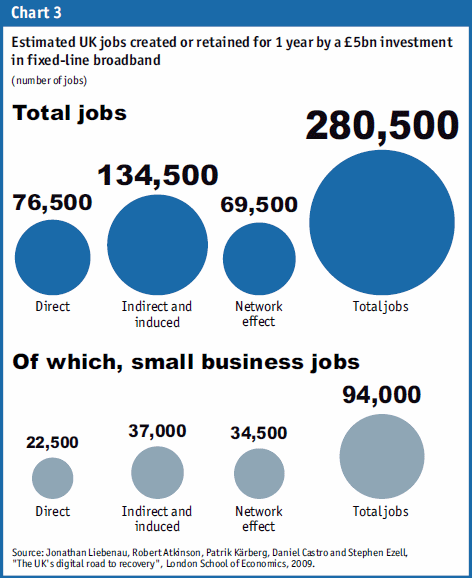Superfast Broadband and 4G Mobile Benefits to UK Economy Exaggerated
The Economist Intelligence Unit (EIU) has published a new Huawei sponsored study that says “a good dose of reality” is in order as it questions whether the new fixed line superfast broadband and 4G mobile solutions can really deliver the “sizeable boost to GDP growth” and job creation, which are so often touted by the UK government.
Research from consultancy firm McKinsey suggests that the Internet accounts for over 5% of the UK’s GDP (possibly as much as 7%) and the Boston Consulting Group last year predicted that this could rise to 13% by 2015, which would take place alongside the current plan to boost broadband speeds and coverage to 90% of UK people by March 2015.
Advertisement

But the EIU report, which is based on a “thorough review of existing research” as well a series of in-depth interviews conducted with 19 industry experts and policymakers, correctly cautions that superfast broadband will deliver growth, jobs, better education, public services and healthcare improvements but probably not to the level expected.
The EIU Report said:
“Will this next generation of connectivity, however, with its blazing speeds, continue to deliver prosperity in the same way that previous leaps have? The central argument of this report is that, while the gains from significantly faster connectivity will indeed be sizeable over time, a good dose of reality is also in order. Existing networks are capable of delivering many of the services anticipated over the next few years.
Obstacles are also numerous to utilising even the existing technology capabilities to good effect, including a shortage of skills and resistance to change. In this context, some of the expectations about the early returns from superfast broadband rollout in the UK may be overstated.”
The report goes on to warn that “it is difficult to see” how the impact of faster services with better coverage will “match that resulting from the earlier switch from dial-up to broadband Internet”. Indeed, as has been discussed many times before, it probably won’t match because superfast services are more of an evolution than a revolution in how we connect to the internet.
On top of that superfast services are often more expensive and the current plans typically focus on improving connectivity in areas that usually already have reasonable or good connections. As a result superfast services can end up in competition with existing and cheaper standard broadband packages, which is a tough market to crack.
The EIU Report said:
“In the near term, ensuring pervasive Internet access to all parts of society—rural users, the elderly and others—will be at least as beneficial to society as a whole as upgrading to superfast broadband.”
Telecoms providers and ISPs will also need to spend a significant amount of money on development of the new networks, with BT expected to spend a total of £3.5bn (£2.5bn from private funding). A further £1bn or so will come from the government’s Broadband Delivery UK (BDUK) office, which is expected to be match-funded by local authorities and the private sector. Further cash from the EU is also likely. In terms of private investment alone it could, in some cases, take around 10 years to earn this back.
Advertisement
However, in order to stay competitive, such work is now more of a necessity for ISPs. The real area of change will come from connecting those whom would otherwise be left out in the cold with slow or unreliable connections.
According to the EIU report, a short-term boost to jobs is inevitable (especially among telecoms engineers), yet the “creation of jobs in some industries and regions may very well be partly offset by job losses elsewhere“. Wider reforms of the health system itself are also called for and “a shortage of [IT] skills” must be similarly addressed to help deliver on the full benefits.
Superfast Britain? Myths and realities about the UK’s broadband future
http://www.managementthinking.eiu.com/superfast-britain.html
Mark is a professional technology writer, IT consultant and computer engineer from Dorset (England), he also founded ISPreview in 1999 and enjoys analysing the latest telecoms and broadband developments. Find me on X (Twitter), Mastodon, Facebook, BlueSky, Threads.net and Linkedin.
« ASA UK Bans Virgin Media Advert for Misleading Fibre Optic Coverage Claims

















































Comments are closed